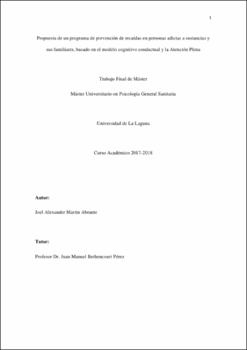Propuesta de un programa de prevención de recaídas en personas adictas a sustancias y sus familiares, basado en el modelo cognitivo conductual y la Atención Plena.
Date
2018Abstract
It have not been able to stabilize the abstinence in the medium and long term,
becoming one of the main problems of the drug addict, of his family and society in
general. Based on the fact that the prevention of cognitive-behavioral relapses of Marlatt
and Gordon is the most used intervention, the hypothesis of this work is that if the people
who are part of this treatment receive, in addition, a series of sessions based on
mindfulness or attention full and their relatives and close friends are part of the process,
the results (time of abstinence, self-esteem, perceived family and social support, etc.) will
be maintained over time and will be more consistent. Los tratamientos orientados a la prevención de recaídas en el consumo de
sustancias no han conseguido estabilizar la abstinencia a medio y largo plazo,
convirtiéndose en uno de los principales problemas del drogodependiente, de su familia
y la sociedad en general. Partiendo del hecho que la prevención de recaídas cognitivoconductual de Marlatt y Gordon es la intervención más utilizada, la hipótesis de este
trabajo es que si las personas que forman parte de ese tratamiento reciben, además, una
serie de sesiones basadas en mindfulness o atención plena y sus familiares y allegados
forman parte del proceso, los resultados (tiempo de abstinencia, autoestima, apoyo
familiar y social percibido, etc.) se mantendrán más en el tiempo y serán más consistentes.




